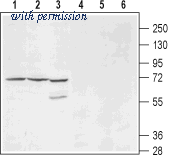product summary
Loading...
company name :
Alomone Labs
product type :
antibody
product name :
Anti-KCNS1 (KV9.1) (extracellular) Antibody
catalog :
APC-131
clonality :
polyclonal
host :
domestic rabbit
conjugate :
nonconjugated
clone name :
NA
reactivity :
human, mouse, rat
application :
western blot
more info or order :
citations: 1
image
image 1 :

Western blot analysis of mouse (lanes 1 and 4), and rat (lanes 2 and 5) brain membranes and human HL-60 promyelocytic leukemia cell lysates (lanes 3 and 6): - 1-3. Anti-KCNS1 (KV9.1) (extracellular) Antibody (#APC-131), (1:200).4-6. Anti-KCNS1 (KV9.1) (extracellular) Antibody, preincubated with KCNS1/Kv9.1 (extracellular) Blocking Peptide (#BLP-PC131).
image 2 :

Peptide (C)EDVRDDPVLRRLE corresponding to amino acid residues 233-245 of rat KCNS1 (AccessionO88758). 1stextracellular loop.
image 3 :

Western blot analysis of rat dorsal root ganglia lysates: - 1.Anti-Stomatin-like Protein 1 (extracellular)Antibody (#AIP-001) (1:500).2. Anti-Stomatin-like Protein 1 (extracellular) Antibody preincubated with the negative control antigen.
product information
CAT :
APC-131
SKU :
APC-131-CF_0.2 ml
Product Name :
Anti-KCNS1 (KV9.1) (extracellular) Antibody
Group Type :
Antibodies
Product Type :
Antibodies
Clonality :
Polyclonal
Accession :
O88758
Applications :
WB
Reactivity :
Human Rat Mouse
Host :
Rabbit
Blocking Peptide :
BLP-PC131
Homology :
Mouse, human - 12/13 amino acid residues identical
Formulation :
PBS pH7.4
isotype :
Rabbit IgG
Peptide confirmation :
Confirmed by amino acid analysis and mass spectrometry
Reconstitution :
0.2 ml double distilled water (DDW).
Antibody Concentration After Reconstitut ... :
1 mg/ml
Storage After Reconstitution :
The reconstituted solution can be stored at 4°C for up to 1 week. For longer periods, small aliquots should be stored at -20°C. Avoid multiple freezing and thawing. Centrifuge all antibody preparations before use (10000 x g 5 min).
Preservative :
No Preservative
Immunogen Location :
1st extracellular loop
Label :
Unconjugated
Storage Before Reconstitution :
The antibody ships as a lyophilized powder at room temperature. Upon arrival, it should be stored at -20°C
Shipping and storage :
Shipped at room temperature. Product as supplied can be stored intact at room temperature for several weeks. For longer periods, it should be stored at -20°C
immunogen source species :
Rat
Sequence :
(C)EDVRDDPVLRRLE, corresponding to amino acid residues 233-245 of rat KCNS1
Product Page - Scientific background :
K+ channels are transmembrane proteins expressed in many excitable and non-excitable cells. Functional entities are formed by the tetrameric assembly of α subunits which could be done in a homomeric or heteromeric fashion. In addition, the association of β subunits is also required for the proper function of K+channels. Various splice variants are also expressed, thereby complicating the picture1,2.K+ channels belonging to the KV9 subfamily resemble the delayed-rectifier class of K+ channel a subunits. These channels include six transmembrane domains, an ion selective pore, a leucine zipper and positively charged amino acids in S4 the voltage sensor domain. Interestingly, both KV9.1 and KV9.3 channels are electrically silent delayed rectifying K+ channels. However, they are responsible for modifying the activity of other K+ channels such as that of KV2.1, yielding currents different from those of KV2.1 on its own1.KV9.1 is mainly expressed in the brain, human lens epithelial cells, kidney, prostate and testis. That of KV9.3 is more generalized and ubiquitous1.Interestingly, a polymorphism in the gene encoding for KV9.1 was identified and associated with high risks of suffering from neuropathic pain3. Evidently, additional work needs to be done to evaluate and decipher the role of KV9.1 (if at all) in chronic pain states.
Applications may also work in :
WB
Supplier :
Alomone Labs
Target :
Potassium voltage-gated channel subfamily S member 1
Short Description :
A Rabbit Polyclonal Antibody to KCNS1 (KV9.1) Channel
Long Description :
Alomone Labs is pleased to offer a highly specific antibody directed against an extracellular epitope of the rat KV9.1 channel. Anti-KCNS1 (KV9.1) (extracellular) Antibody (#APC-131) can be used for western blot analysis. It has been designed to recognize KV9.1 from human mouse and rat samples.
Negative Control :
BLP-PC131
Positive Control :
NA
Synonyms :
Potassium voltage-gated channel subfamily S member 1
Lead Time :
1-2 Business Days
Country of origin :
Israel/IL
Applications key :
CBE- Cell-based ELISA, FC- Flow cytometry, ICC- Immunocytochemistry, IE- Indirect ELISA, IF- Immunofluorescence, IFC- Indirect flow cytometry, IHC- Immunohistochemistry, IP- Immunoprecipitation, LCI- Live cell imaging, N- Neutralization, WB- Western blot
Specifictiy :
KCNS1
Form :
Lyophilized powder. Reconstituted antibody contains phosphate buffered saline (PBS), pH 7.4.
Comment :
Contact Alomone Labs for technical support and product customization
Species reactivity key :
H- Human, M- Mouse, R- Rat
Is Toxin :
No
Purity :
Affinity purified on immobilized antigen.
UNSPSC :
41116161
Clone :
NA
Standard quality control of each lot :
Western blot analysis
Antigen preadsorption control :
1 µg peptide per 1 µg antibody
Application Dilutions: Immunohistochemis ... :
Contact Alomone for information
Application Dilutions: Western blot wb :
1:200
more info or order :
company information

Alomone Labs
Jerusalem BioPark (JBP), Hadassah Ein Kerem
P.O. Box 4287
Jerusalem 9104201
P.O. Box 4287
Jerusalem 9104201
info@alomone.com
http://www.alomone.com972 2 531 8002
headquarters: Israel
related products
browse more products
questions and comments
